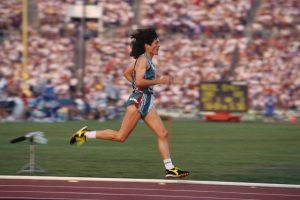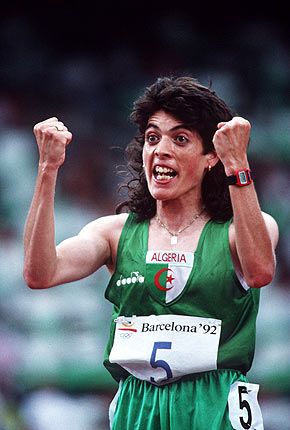
In the summer of 1992, the world watched as a woman in Algeria’s red and white colors surged down the final stretch of the 1,500-meter race at the Barcelona Olympics. When she crossed the finish line, history was made: Hassiba Boulmerka became the first African woman to win Olympic gold in middle distance running. But her victory was about more than medals, it was about courage, defiance, and paving the way for generations of women athletes across Africa.
A Dream Born in Constantine
Hassiba Boulmerka was born on July 10, 1968, in Constantine, Algeria, a city rooted in tradition. Growing up in a conservative environment, girls were rarely encouraged to pursue sports, especially not one as physically demanding as middle distance running.
But Hassiba was different. She discovered her love for running at a young age, often training in secret to avoid scrutiny from neighbors who questioned why a young woman would choose athletics over preparing for marriage.
Her journey wasn’t just about becoming a world class athlete. It was about challenging deep rooted norms in her society.
Barcelona 1992: The Race That Changed History
After years of thorough training and international competitions, Hassiba arrived at the 1992 Barcelona Olympics as one of the favorites in the women’s 1,500m.
As the race began, the field was tight, but in the final lap, Hassiba broke free as her long strides carried her to victory. She crossed the finish line in 3 minutes 55.30 seconds, winning not just for Algeria, but for all African women.
With that gold medal, Hassiba Boulmerka became the first African woman to win Olympic gold in middle distance running, a feat that remains iconic in athletics history.
Facing Criticism With Grace
Despite her achievements, Hassiba’s journey wasn’t met with universal celebration. Back home, some religious conservatives criticized her for competing in shorts and appearing on international stages. Threats and societal pressure forced her to relocate temporarily to Europe to continue training. Yet, she never let the negativity stop her.
Her defiance inspired not only athletes but also women fighting for space in male dominated societies across Africa and the Arab world.
Beyond the Track With a Lasting Legacy
Hassiba retired from athletics in 1997, but her work didn’t end there. She became a member of the International Olympic Committee (IOC), using her platform to advocate for gender equality in sports.
Her legacy lives on in every African woman who takes to the track today. Athletes like Caster Semenya and Faith Kipyegon stand on the shoulders of this Algerian legend.
Conclusion
Hassiba Boulmerka’s story reminds us that true champions aren’t measured only by gold medals but by the barriers they break and the lives they touch. She ran for freedom, she ran for equality and won for all of us.
Who is your favorite African woman in sports? Let us know in the comment section.

